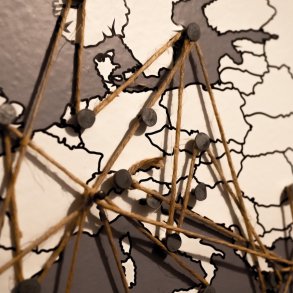By Morya Short for Enlivening Edge Magazine
The EU referendum results have been shocking for many, and an invitation to bad behaviour for others. However, amidst the chaos there might be some bright spots for the UK, particularly if we marshal the lessons into collective learning, and move what could be “one-off” political engagement by some folks, into something more lasting.
Can we leverage Teal ideas to create a new type of politics? It seems clear, from the actions and reactions over the last ten years, that the electorate’s desire for a new type of politics is growing stronger. The attempts to score political points within and across parties after the shock EU Brexit results might have once been viewed as an inevitable aspect of politics; today it is viewed with disgust by many. We were left “rearranging the deck chairs on the Titanic” as we focused on who will lead the main parties, instead of creating a cross-party group to work out how we handle the EU exit, fix the banking system, the economy, and inequality, plus make our plans to cope with a significantly warmer world—to name just a few of the challenges.
A call for change
Back in 2009, the UK electorate discovered that some of their “trusted,” democratically-elected members of Parliament were being less than fully honest about their expenses. What followed was a cascade of accusations and rebuttals which the media dubbed the “Expenses Scandal.”
Cheating on expenses was a source of shame and in some cases resignation and legal action. But what the crisis also made clear was that the expenses rules themselves were much more generous than in most companies, so the rules in fact “invited” the “spirit of reasonable expenses” to be flouted. For example, in 2009 up to £250 could be claimed without a receipt.1
At the time, the feeling in the country was that “Politics” needed shaking up, that a new type of leadership was required. Using phrases like “we are in this together,” Prime Minister Cameron and his ministers encouraged the electorate to swallow their austerity budget. It all seemed as if some progress might be made. Perhaps, politicians had seen the light and had realized that infighting, polarisation of issues around ideologies, lying, and cheating were aspects of political life which urgently needed to change? Sadly, all this was just political business as usual; the attractive seemingly-collaborative, “let’s all pull together” language was just rhetoric, just a soundbite.
Meanwhile the “EU Brexit” referendum campaign has made it very clear that nothing substantial has changed in the way we “do politics” in the UK. The referendum campaign was conducted just like any other: information was “massaged” into statements designed, not to provide understanding or clarity, but to influence the voter. Debates were attacks, not a reasoned discussion about the pro’s and con’s of staying in or leaving the EU. All the time, the protagonists encouraged us to make decisions with our emotions or via biased campaign literature, written in varying shades of terminological inexactitudes.
Can Teal help?
Reinventing Organizations by Frederic Laloux ignited many people’s imagination and prompted action. Inspirational and practical case studies from the book have convinced a more-than-ready audience that this is the time to reinvent how we work together. The case examples demonstrate the business imperatives behind the three Teal-organization-stage breakthroughs: self-management, bringing the whole self to work, and emphasis on the organization’s evolutionary purpose. At the same time as showing the business case for each of these three breakthroughs, Laloux shows us a world where these breakthroughs are already working—and working well.
Throughout the book he introduces many practical approaches to solving business and employment issues in new ways, such things as Theory U, systemic thinking, and Appreciative Inquiry. All the examples in the book are from businesses of varying sizes. Now it’s time to ask: could the same approaches be used effectively in government?
A political party based on Teal ideals would focus more on values, purpose, and “how” to solve problems than on making policy promises. Such a party would be value-driven, not ego-driven. It would be agile and responsive to the needs of people, communities, country, council, and state.
Sound like an impossible dream?
Perhaps.
Discovering what is possible
How can we create a new way for Politics and governance? What could help us stem the tide of politicians who are driven by rabid self-interest and intent on enhancing their political career as their first priority?
The appetite for “new ways” is clear; perhaps what we need is collaborative, co-creative work which defines what these “new ways” might be.
Asking politicians themselves for something different has not worked. Perhaps the reason why Politics stays the same is that not enough energy is being put into creating an alternative? (There are some notable exceptions; see notes for details.).2
How can we begin a revolution in governance in an evolutionary way? How can Teal personal and organisational models help?
Successful Teal organisations combine personal development as well as business and organisational evolution. The decision to “go Teal” creates a push-pull dynamic where new business approaches challenge employees to rise to the new stage of consciousness enabling self-management, wholeness, and evolutionary purpose. In turn, as the people grow and develop, the organisation continues to grow and change. What emerges is a transformation, which if done sensitively allows a new organisation to evolve from the old.
It is this evolutionary process which might be Teal’s greatest gifts to the world of Politics. Allowing old ways to “die” and be replaced by a new form, is a way to avoid getting stuck debating “what’s wrong” with the old system. Fighting the old system is one way to make change, but coupling that with creating a clear new path will accelerate lasting transformation—transformation which includes developing new worldviews as well as new processes and practices which support ongoing evolution.
This approach is fully expressive of Buckminster Fuller’s insight: “You never change things by fighting the existing reality. To change something, build a new model that makes the existing model obsolete.” ~ R. Buckminster Fuller
Invitation to start the experiment
So how do we start this transformation in Politics? Asking the right questions will certainly be a good start. Beyond that, collaboration, experiments, and prototypes will be needed to chart the way.
If you feel that Teal has potential to assist a new form of Politics emerge, and you would like to take part in an experiment, please click here: Join the Experiment Now
The next step will include an on-line call with participants, to kick off the collaboration and plan further steps.
Notes:
1. http://news.bbc.co.uk/1/hi/uk_politics/8039590.stm
2. Crowdacracy. RSA Flat-pack democracy
 Morya Short supports managers and teams to experience greater success, creativity, and engagement. She has over 20 years’ experience working in small business and in multi-national corporations. She is the creator of the “Thriving Programmes,” which combine workshops and hybrid coaching to transform businesses, managers and teams. She is the founder of POSE and co-creator of Leader Circles. She is currently researching next-generation organisational models, such as the Teal model, with a view to integrating best practices into the Team Thriving Programme. POSE Linkedin Twitter Meet Me
Morya Short supports managers and teams to experience greater success, creativity, and engagement. She has over 20 years’ experience working in small business and in multi-national corporations. She is the creator of the “Thriving Programmes,” which combine workshops and hybrid coaching to transform businesses, managers and teams. She is the founder of POSE and co-creator of Leader Circles. She is currently researching next-generation organisational models, such as the Teal model, with a view to integrating best practices into the Team Thriving Programme. POSE Linkedin Twitter Meet Me





Dear Morya,
Reading your article captured my full attention this morning even in the midst of moving home and packing boxes. Thank you! I could hear myself say: Yes, Yes …. ‘collaboration, experiments, and prototypes will be needed to chart the way’. We need that in every field/sector/domain of our culture. I just appreciate so much the inner space from which you are speaking and writing and I like the strap-line of your website ‘Personal, Organisational & Social Evolution – Development Programmes Powered by Purpose’ . It is precisely at all those levels at which transformation to Teal needs to be happening.
A vital marker of embodied Teal consciousness is the capacity to heal organisational and social systems, by helping the parts and the whole align in new configuration that supports evolution. Applied to politics this could mean to focus, initially, on creating not a new Party, but a network of people involved with politics at any level (maybe starting with local authorities, since we already know some of them there), who are inspired by Teal value. If the members of that network would embody the three breakthroughs, individually and collectively, then out from that, new forms of political action may emerge, like issue-specific working groups that over time can become a system of influence growing the new mainstream. To get a better sense of what I mean by that progression, why not look up the “three stages of transformation” model in my recent article “Towards a Social Movement for Change in Health & Social Care“.
Paraphrasing a quote from Meg Wheatley’s essay on “Using Emergence to Take Social Innovations to Scale,” I wrote:
“Understanding the three stages of how life creates radical change and takes things to scale helps me to understand what conditions we need to create in order to launch a social movement, one that can mobilise citizens and communities to lead social action for health.”
You can of course replace the word health with politics.
Thanks Anna, I will take a look as you say the process is the same be it health, education, or politics.
Thanks Anna, I will take a look.
Hi Anna.. come and take a look at what we are doing at http://www.thealternative.org.uk – very much based on teal principles
Apologies.. Anna and Morya!
Thank you for the invitation Indra. I heard about it from another friend which means connections are starting to be created.
HI guys – we work in a local authority, we’re totally inspired by the aspirations held in the article and in these discussion items! We live in a world where social services need to be organised in radically different ways – Buurtzorg is a classic example we need to try and follow.